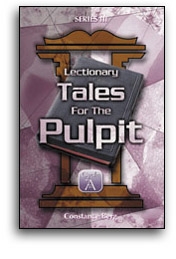A Random Act Of Kindness
Stories
LECTIONARY TALES FOR THE PULPIT
Series III, Cycle A
In his book A Time to Fish and A Time to Dry Nets (1996: Lakewood Publishing Co.), author Alvin Johnston tells about his roots in Warroad, Minnesota. His grandfather, Grandpa Gruhl, arrived in Warroad in 1896 with his wife Sofia and their five children, having traveled in two covered wagons. Sofia and her newborn baby were in the wagon while the children walked behind. Sofia and baby Anna Belle died of consumption (tuberculosis) the first winter they were in Warroad.
Johnston's mother, Mabel, was the second of these five children. In Johnston's book, Mabel recalls how difficult, boring, and long the days were in a one--room house. Their father would be gone days at a time hunting or working in the woods. Mabel, who was twelve, served as housekeeper for her family. It was a difficult situation to be in. It seems others were noticing her situation also.
Mabel remembers one day when she and her sister heard footsteps outside the door. Thinking it was their father, they rushed to open the door only to find an old American Indian man standing there. "His forehead was covered with scar tissue and he was bald--headed. Taking one look at him, the girls crawled under a bed, so frightened they could not move. They knew he came as a friend when he held out a fresh piece of moose meat. Their visitor, called Ayashwas, was the chief of Warroad and Buffalo Point tribes. A kindly old man, he had stopped by their cabin to help them out. He was a great warrior in the fierce battle between his people and the Sioux. On a ridge called Two Rivers, over fifty years before, he was scalped and left for dead on the battlefield."
Winters were very difficult with the harsh weather and an entire family crowded into one room. States Johnston, "... the kindness of the local Indians saved them by bringing them venison, rabbits, and moose meat. That winter a bond was formed between the local Indians and our family that lasted through three generations."
Beware of practicing your piety before others in order to be seen by them, for then you have no reward from your Father in heaven ... For where your treasure is, there your heart will be also.
Johnston's mother, Mabel, was the second of these five children. In Johnston's book, Mabel recalls how difficult, boring, and long the days were in a one--room house. Their father would be gone days at a time hunting or working in the woods. Mabel, who was twelve, served as housekeeper for her family. It was a difficult situation to be in. It seems others were noticing her situation also.
Mabel remembers one day when she and her sister heard footsteps outside the door. Thinking it was their father, they rushed to open the door only to find an old American Indian man standing there. "His forehead was covered with scar tissue and he was bald--headed. Taking one look at him, the girls crawled under a bed, so frightened they could not move. They knew he came as a friend when he held out a fresh piece of moose meat. Their visitor, called Ayashwas, was the chief of Warroad and Buffalo Point tribes. A kindly old man, he had stopped by their cabin to help them out. He was a great warrior in the fierce battle between his people and the Sioux. On a ridge called Two Rivers, over fifty years before, he was scalped and left for dead on the battlefield."
Winters were very difficult with the harsh weather and an entire family crowded into one room. States Johnston, "... the kindness of the local Indians saved them by bringing them venison, rabbits, and moose meat. That winter a bond was formed between the local Indians and our family that lasted through three generations."
Beware of practicing your piety before others in order to be seen by them, for then you have no reward from your Father in heaven ... For where your treasure is, there your heart will be also.


